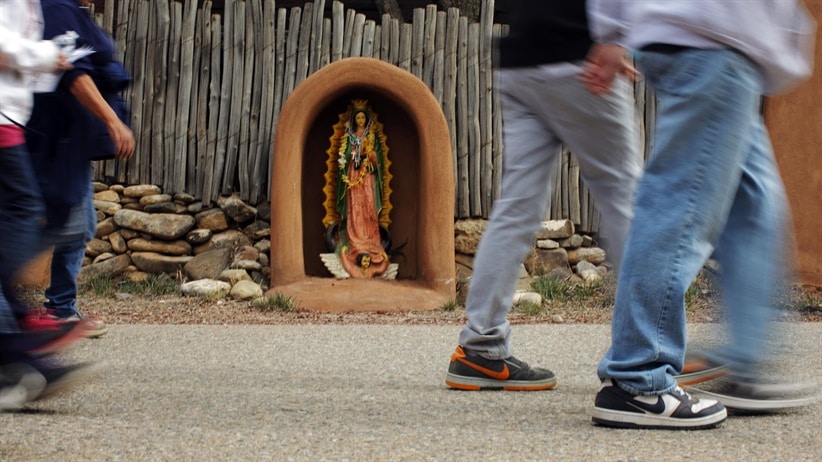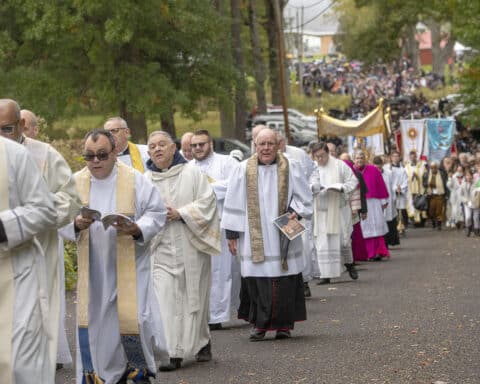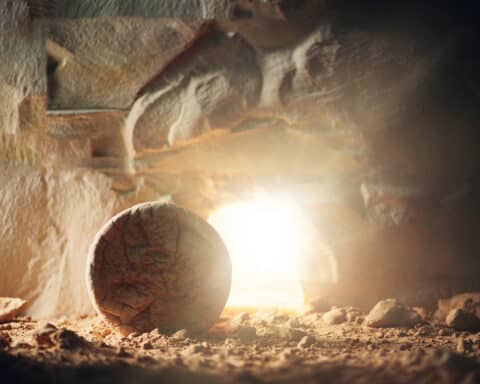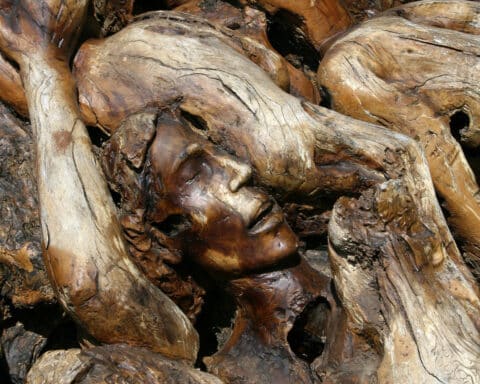Some fear it. Others hope for it. Some see it as proof of God’s mercy; others as testimony to God’s wrath. Many don’t know anything about it, while many more have forgotten what they once knew.
The “it” is purgatory, and when it comes to Catholic beliefs about the afterlife, the Church’s teachings on purgatory have long been among its most contested and misunderstood.
Yet, despite all the confusion, the teachings themselves aren’t that complicated. At their most basic, they can be boiled down to nine essential truths — truths that not only illuminate the Church’s doctrine, but also reveal the eternal significance of those teachings for us and those we’ve lost.
So, what are those essentials?
1. Purgatory exists
That may seem like stating the obvious, but for some Catholics, purgatory has become what pastor, author and blogger Father Dwight Longenecker called “the forgotten doctrine.”
“Many modern Catholics don’t know what purgatory is anymore,” said Father Longenecker, who blogs at Standing On My Head. “They’ve bought into the idea that sin has no consequences, that everyone goes to heaven because God is too nice to send anyone anywhere else.”
The Church’s doctrine on purgatory, however, proclaims the opposite. It reminds us that sin does have consequences — eternal ones — and that while God is Love, he still honors the free choices made by men and women.
“That’s the terrifying compliment God pays the creature,” said Dr. Regis Martin, professor of theology at Franciscan University and author of “Still Point: Loss, Longing, and Love of God” (Ave Maria, $11.95). “He takes seriously the freedom we exercise, even if it carries us straight into hell.”
That being said, he continued, “While hopefully few of us are so wicked that we would choose to be wretched forever without God, not many of us are so pure that we can be catapulted straight into the arms of God. Most of us are somewhere in between.”
Hence the need for purgatory — the final purification of those who die in friendship with God but who haven’t fully broken their attachment to sin or atoned for wrongs done in this life.
“When we stand before Christ the Judge, all the compromises we’ve made, all the gray areas into which our choices led us, have to be accounted for,” said Martin. “We’ve got to square accounts with the Judge.”
| What’s An Indulgence? |
|---|
|
An indulgence is a remission from either part or all of the temporal punishment a soul must undergo because of sin. We’re able to receive this remission thanks to the suffering and sacrifice of Christ, as well as the suffering, sacrifice and good works of all those united with him in perfect friendship — namely, the Blessed Virgin Mary and the saints.
How do I get an indulgence?
Indulgences can be obtained in many ways, including making pilgrimages to holy sites, such as basilicas and shrines. Indulgences are also attached to special occasions, such as papal blessings or attending Mass on particular feast days, as well as through routine acts of piety — reading the Scriptures, praying the Rosary or the Way of the Cross and Eucharistic adoration.
General conditions for gaining an indulgence include:
– A Catholic must be in a state of grace.
– He must have no attachment to sin.
– He must make a good confession to a priest and receive Holy Communion.
– He must pray for the intentions of the Holy Father (typically one Our Father and one Hail Mary).
– No more than one plenary indulgence can be obtained each day.
– The indulgence may be obtained for oneself or applied to the souls of the deceased.
|
2. Purgatory isn’t merely a punishment.
It’s a merciful gift and a testimony to God’s love.
“Sometimes, people hear about the sufferings of the souls in purgatory and they think suffering is the desire of a vindictive God, a God who wants his pound of flesh,” said Robert Corzine, vice president for Programs and Development at the St. Paul Center for Biblical Theology.
“But that’s not the case at all,” he continued. “God forgives us immediately when we ask. The role of suffering is to undo the damage we’ve done. It’s God the Healer applying the remedy to make us perfect images of Christ.”
And perfect images of Christ is exactly what God calls each of us to become.
According to the Catholic doctrine of salvation, God doesn’t simply desire to save us from hell — from a state of eternal separation from him. More fundamentally, he desires to save us from sin, from being anything less than the men and women he created us to be.
“God is like a great heart surgeon, trying to give us the new hearts we need,” Corzine said. “But we keep flopping around on the table, moving away from the knife. Death then is like the anesthetic. In purgatory, we’re no longer able to resist the healing we need, and he can finish the task he began during our lifetime.”
3. The suffering endured by souls in purgatory isn’t physical pain.
Through the centuries, artists striving to convey the sufferings of purgatory have depicted men and women tormented by a burning fire. But those illustrations aren’t a literal representation of the goings-on in the purgative state. They can’t be. In purgatory, the soul remains separated from its body, so it can only suffer spiritually, not physically.
That’s not to say, however, that the flames of purgatory aren’t real. They are.
“The fire by which we’re purified is an interior burning for the love of God,” explained Susan Tassone, author of seven books on purgatory, including “Prayers, Promises, and Devotions for Holy Souls in Purgatory” (OSV, $9.95). “Immediately after their death, the souls in purgatory saw God in all his glory. They saw his love, his goodness, and the plans he had for us. And they yearn for that. They burn for it, with a yearning that surpasses the heat of any earthly fire.”
In other words, the primary pain endured by those in purgatory is the loss of the sight of God. They suffer from what Tassone called, “a spiritual fever.”
As that fever rages, it separates the soul from sin, a process almost equally painful.
“To the extent we’re attached to our sin, becoming detached from it hurts,” said Corzine. “Seeing it in all its horror — how it wounded us and wounded others, how it led us away from God’s perfect plan — no physical flames could be as painful as that.”
4. The souls in purgatory experience joy, as well as pain.
In the “Divine Comedy,” as Dante makes his way through purgatory, the souls he encounters suffer, but unlike the souls he met in hell, they suffer willingly and gladly, with no self-pity and always eager to return to their sufferings when Dante’s questions cease.
In their eagerness, those fictional souls testify to the enduring Catholic teaching that purgatory isn’t the outermost room of hell, but rather the anteroom of heaven. Every soul in purgatory is bound for glory. Their fate has been sealed, and ultimately it’s a blessed fate. Therefore, the time they spend in purgatory, whether short or long, is a time marked not only by suffering, but also by joy.
“Anything worthwhile requires pain to make progress, but it’s pain with a reward at the end,” said Father Longenecker. “Sometimes, it helps to think of purgatory like the process of getting physically fit. There’s pain, but it’s a sign of progress. It means you’re on the road to where you eventually want to be. That makes it a joyful pain.”
5. Our prayers for the dead matter eternally.
The souls in purgatory may be bound for glory, but the process of purgation still can be long and painful. Save for humbly submitting to the purifying fire of Christ’s love, there’s nothing those souls can do to speed up the process or mitigate the pain.
That’s where we come in.
“We need to be greedy for graces for the souls in purgatory,” said Tassone. “When the soul leaves the body, the time for merit is up. The soul is helpless. That’s why they need our prayers — the Rosary, adoration, the Way of the Cross and, most of all, the Mass. The Masses we have offered for the souls in purgatory are the best thing we can do for our beloved dead. That’s because the Mass is the highest form of worship, the highest form of prayer.”
| Praying For the Holy Souls |
|---|
|
How can you help the souls in purgatory?
1. Pray the Rosary for departed friends, relatives and the most forgotten souls.
2. Daily, recite this simple prayer: “Eternal rest grant unto them, O Lord, and let perpetual light shine upon them. May the souls of the faithful departed, through the mercy of God, rest in peace.”
3. Visit a loved one’s grave and say a brief prayer for them.
4. Have a Mass celebrated for loved ones on the anniversary of their death.
5. Have 30 days of Gregorian Masses celebrated for loved ones through the Pious Union of St. Joseph or other missionary orders that offer this ministry.
|
“It really is one of the most consoling doctrines of the Church,” added Martin. “None of us stands alone. We stand on the shoulders of giants, the foremost giant being Christ. Our sufferings and sacrifices can be parlayed into actual assistance for the holy souls because of his suffering and sacrifice.”
In many ways, he continued, our relationship to those in purgatory is simply an extension of “the logic of love,” where “You extend yourself so that another might have an easier time of it. And that principle isn’t bound by death.”
It’s also not bound by time. The Church teaches that purgatory operates outside of space and time as we on earth experience it. Which means we should never stop praying for those we’ve lost.
“No prayer is ever wasted,” Tassone said. “The prayers we pray for our loved ones throughout the entirety of our lives play a part in helping them enter into heaven.”
6. The holy souls intercede for us.
The souls in purgatory can’t do anything for themselves, but the Church has long believed that they can do something for us: They can pray for us, helping obtain for us the graces we need to follow Christ more perfectly.
“We have such great intercessors in the holy souls,” said Tassone. “They’re interested in our salvation. They want to help ensure that we understand the malice of sin and the importance of conforming our lives to God’s will, so that we can go straight to heaven when we die.”
The same is doubly true, she continued, of the souls now in heaven, whom our prayers helped.
“Those souls become like our second guardian angels, taking us under their wing,” she explained. “That’s because the gift we helped give them was the Beatific Vision, which is the greatest gift of all.”
7. The Church’s teachings on purgatory are rooted in Scripture.
If you’re looking for scriptural evidence for purgatory, start in the Second Book of Maccabees (12:45), where Judas Maccabee orders prayers and sacrifices for fallen soldiers who committed idolatry shortly before their death.
“Their beseeching implies there is hope even beyond the grave for those who defiled themselves,” Martin said.
In the New Testament, St. Paul likewise hints at the cleansing fires of purgatory when he writes, “If any man’s work is burned up he will suffer loss though he himself will be saved” (1 Cor 3:12-15). He also seemingly prays for the soul of Onesiphorus in 2 Timothy 1:18.
Moreover, according to Corzine, the existence of purgatory is the only way to make sense of scriptural assertions such as, “No unclean thing will enter [heaven]” (Rv 21:27), as well as commands like “Be perfect just as your heavenly Father is perfect” (Mt 5:48).
“Logic demands purgatory,” Corzine said. “Without some process of purification after death, the population of heaven would be infinitesimally small, comprised of only the few who allow God to perfect them in this life.”
8. Purgatory wasn’t an invention of the medieval Church.
Although the Church didn’t begin to officially define the doctrine of purgatory until the high Middle Ages (starting at the Second Council of Lyons in 1274), the belief in a purgative state after death is as old as the Church itself.
“The uninterrupted witness of Church history tells us that Christians have always prayed for their dead,” said Corzine. “Even before people used the word ‘purgatory,’ they recognized the need to offer up prayers and have Masses said for those who’ve left this life.”
That uninterrupted witness includes the writings of Church Fathers and Doctors from the first century onward. It also includes records of Catholics commemorating the anniversaries of departed loved ones with Masses and prayers, the inclusion of burying the dead among the spiritual works of mercy, and centuries of Christians who left money in their wills for Masses to be said for their souls.
Said Corzine, “Since the damned cannot benefit by our prayers and the blessed in heaven have no need for our prayers, that enduring witness implies another place or state where souls exist who can benefit from them.”
9. Purgatory is like spiritual summer school.
How’s that?
To start with, just as sitting in a classroom during January is easier than sitting in a classroom during July, doing the suffering and sacrificing it takes to grow in holiness is easier on earth than it is in purgatory.
In part, that’s because “on earth we still have our physical bodies,” Father Longenecker said.
“Our task is to become conformed to Christ,” Father Longenecker told OSV. “That’s a task we’re supposed to do here, and it’s a task for which we’re supposed to use our bodies. It has a physical dimension to it.”
Which is to say, with our bodies we can do good works that break us of attachments to sin and self. We can take a meal to the new mom across the street, buy a coffee for the homeless guy downtown, fast from chocolate for all of Lent, and go on pilgrimages to holy places. Without a body, all those corporal works of mercy — all those ways of loving and serving others, as well as atoning for sin — are impossible.
Even more fundamentally, purgatory is like summer school because, just like summer school, no one has to go there.
“Purgatory is not supposed to be the norm,” concluded Corzine. “God gives each and every one of us all the graces we need in this life to become saints. We can do all the work necessary to become holy here. We just need to make use of the graces he gives us now.”
Emily Stimpson is an OSV contributing editor.





